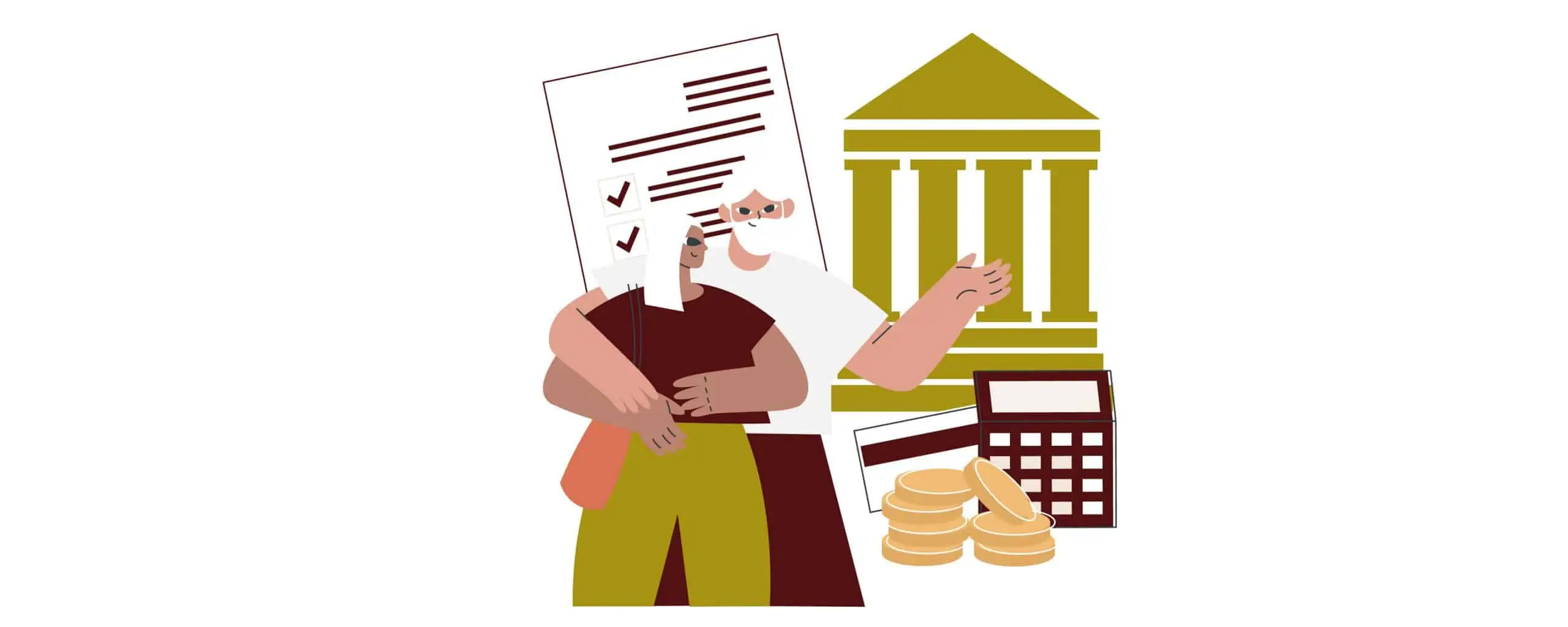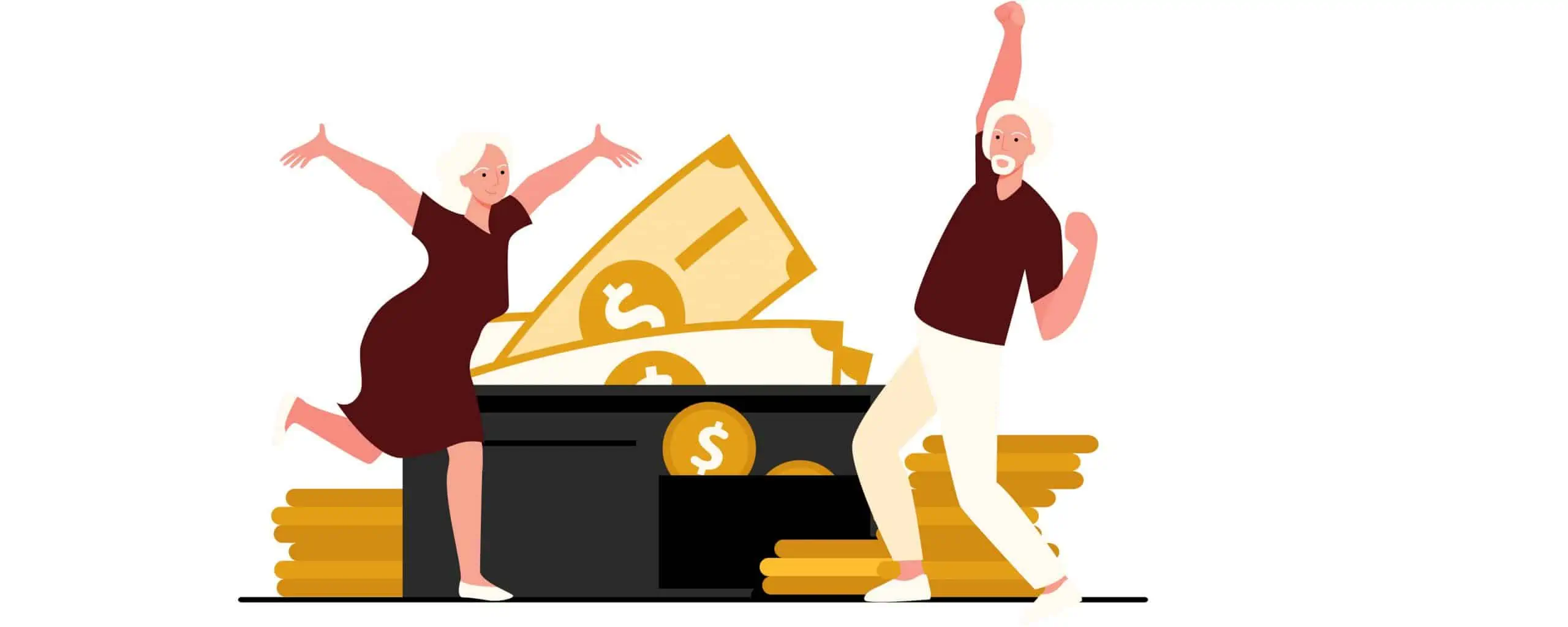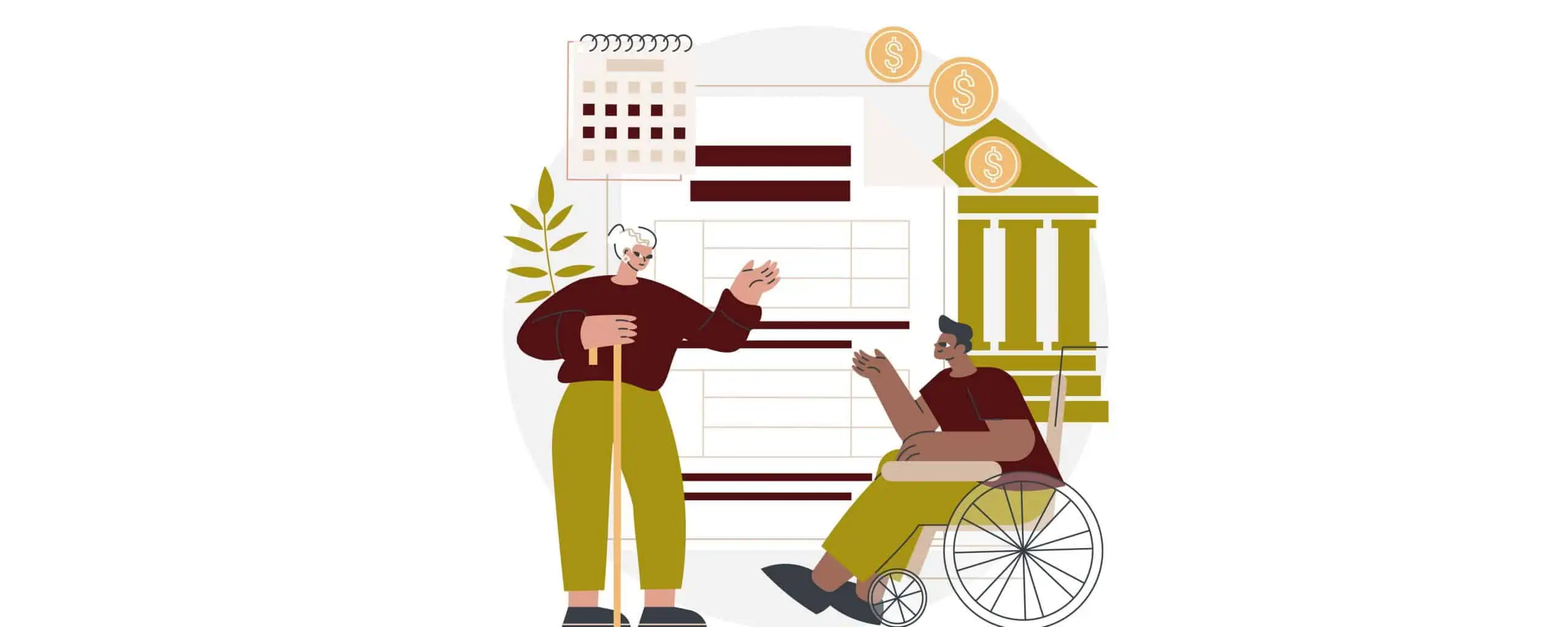Because everybody has a different financial situation, it is natural that the average age of retirement differs a little. There are many factors which can influence the age that you choose to retire, and how comfortably you are able to live.

Depending on your lifestyle and what type of wage category your occupation falls into, it could be worth taking a closer look into retirement savings. This can motivate you to save more or even consider changing your job to a role with better retirement benefits.
Regardless of how old you are or how long you have been working for, it is essential that you are thinking about your future and making plans for retirement. The earlier in life that you start saving, the more time you will have to accumulate money before you need to use it.
This is a complete guide into the essentials of planning for your retirement, with some useful tips that will help you save money along the way.
Thinking About Retirement?

One of the first things you need to do to prepare for retirement and begin planning, is to actually think about it. The average person spends around 20 years in retirement, so it is definitely worth making small changes in order to support yourself in the future.
When you are considering retirement and the rough time frame that you would like to stick to or make a plan around, it is worth thinking about your needs. As an individual, you may want to live a more extravagant or luxurious lifestyle when you retire.
On the other hand, you could find a way of supporting yourself and your significant other so that you can enjoy retirement together. Some people aim to retire at a relatively young age to focus on the things that they are passionate about without the constraints of work.
This isn’t always realistic for everyone, and it is worth thinking about when you want to retire, based on your current circumstances. The first part of preparing for your retirement and creating a realistic plan is to think about your retirement.
Consider the type of lifestyle you can see yourself leading and how you would like to start saving. Whether you want to spend more time with family and the people that you love, or invest towards a more financially stable future, the first step to planning your retirement is to think realistically about it.
The Stages Of Retirement And What To Expect

Did you know that there are actually several stages of retirement? These have been widely recognised and are considered to be some universal parts of the retirement process.
Many people are unaware of the different mindsets that retirees experience on a regular basis. Consider the following stages so that you are fully aware of how you can avoid falling into a negative headspace in the long run.
Pre Retirement
The first stage is pre-retirement, which is arguably the most important when it comes to planning and setting things into motion for your retirement.
While the duration of this stage differs depending on your profession, retirement goals, and age, pre-retirement lasts between 5 and 15 years on average.
Pre-retirement leads up to someone’s actual retirement date, and it normally involves some kind of focus shift.
Most people who want to begin planning their retirement will begin to prioritise their financial planning over progressing within their career.
Planning is an essential part of this stage, which can make your retirement period much smoother in the long run.
This is because you will be able to access more consistent sums of money when needed if you have been saving from a younger age.
Think about the type of career you have, and what kind of regular savings amount is realistic each month.
This can help you determine the rough age of retirement you could actually afford over time.
Full Retirement
Of course, pre-retirement leads to your full retirement, which you can use to reconnect with loved ones, and pretty much do what makes you happy.
Most people enjoy exploring new hobbies or developing existing ones, travelling, or even starting new businesses.
Retirement can be a great way to work on your mental health without the worries of finances or work commitments.
Enjoy spending time doing the things that make you happy, like visiting family and friends more frequently.
The average age of retirement in 65 years old. However, many individuals choose to work for longer than that, or even less.
Depending on what type of retirement you want to achieve and your current pay bracket, it could be worth thinking about your realistic estimated age of retirement.
Disenchantment
Disenchantment is the name given to the period of retirement when the ‘honeymoon phase’ has started to run out.
It is easy for people who have retired to see it as a long break from work or holiday when they don’t need to do anything in particular.
However, this can easily lead to negative emotions such as loneliness, boredom, and a sense of uselessness. These feelings are more likely to slip into long-term depression if it is not addressed at this stage.
This is known as the disenchantment stage, and it is common in many people who are not occupying themselves as consistently during their retirement.
It is not discussed as frequently as other stages, which is why it is worth considering this so that you can plan to avoid these negative feelings.
Reorientation
This is the name given to the process of keeping your mind and body occupied in order to avoid feelings of depression, worthlessness, and falling into a rut of inactivity during retirement.
Because many people rely on their work to give a great deal of their purpose in life, retirement can present a new challenge.
Individuals need to find something that provides a meaningful sense of purpose once they retire so that they have something to work on and avoid feelings of loneliness.
Consider integrating new activities into your weekly routine such as swim classes, volunteering, or pursuing something that you are passionate about.
Setting up a routine can be a great way to stay in touch with your friends and family and make sure that you are getting out of the house regularly.
Some people will also take up a part-time job in something that is easy-going or in a field that they are passionate about.
Others will set up their own businesses providing a service or product that they are talented and skilled in.
Focusing on charity work or engaging in local projects can also be a great way to avoid feelings of low self-worth during retirement.
This is because it allows you to give back to the local community and meet new people who share similar interests as yourself.
Reconciliation And Stability
The final stage of retirement is known as reconciliation and stability. This is when retired individuals feel more confident and content with their choices, and have a consistent routine.
Activities, projects, and tasks that are usually focused on during this stage are relaxing as well as fulfilling.
Because this stage typically happens around 15 years after someone’s official start of retirement, many will need to make health conditions easier to manage or seek additional support when needed.
This can lead to a relocation to a retirement home or community where they can get the support that they need in the later stages of life.
Retirees in this stage are easier to recognise, because they will be content and hopeful in the transition process.
In turn, this makes them less prone to anxiety and depression.
Mental health generally improves during this stage because most people will have found regular routines or activities that work best for them.
Top 10 Tips For Planning For Your Retirement

When it comes to preparing for your retirement in the future, it can be difficult to know where to start.
Because of this, we have outlined some useful tips that can help you plan for your retirement.
Make sure you are being as detailed as possible when you are creating your plan, so that you understand the type of lifestyle you want to lead.
It is also worth appreciating the amount of money which you need to save in order to become financially stable and independent.
Know How Much You Have To Save
One of the most important ways that you can create an accurate plan for your retirement and begin working towards it is to know how much you need to save.
Try to be realistic about the amount that you need to support yourself and work out your disposable income.
It is also recommended that you set up a regular budgeting plan. This can allow you to appreciate how much certain things are likely to cost and estimate how much to save ahead of time ready for your retirement.
Naturally, individuals who are older or closer to retirement age will need to save larger amounts at a time.
This is so that they can retire at an age that they feel comfortable to do so.
People who are younger will not have to save as much money each month when it comes to retirement planning.
However, they will need to do so if they want to retire at a younger age and become financially independent sooner.
Investing towards your future and retirement is never a waste of time or money, so you should begin taking a realistic stance when it comes to creating a plan for your retirement and estimated time frame.
Start Investing Early
Another essential thing that can allow you to retire when you want to is to invest your money wisely. Consider the role that compound interest can play on your retirement savings.
This can help you to prepare for the future by adding impressive amounts of interest to your total over time, and increasing your retirement accounts.
It is easier than ever before to set up small, realistic, regular retirement savings thanks to compound interest.
Because of the way that compound interest works, it is recommended that you start working towards increasing your total savings for retirement sooner rather than later.
It could also be worth figuring out how much you want or need to save in order to retire comfortably.
This is because only 2 of 10 Singaporean individuals have actually taken the time to calculate how much they need to save for retirement.
The other 80% haven’t even started to plan for their retirement!
Thus, make sure to take a closer look at your accounts and estimate the total needed to support your retirement.
Plan Your Investing Accurately

Make sure you are being realistic and as accurate as possible when you are planning your investments towards your retirement.
It is generally recommended that you aim to set aside around 15% of your annual income for your retirement savings.
While there is some variation with income and your basic needs, you should try to plan your investments accurately in accordance with this if possible.
Reducing your risk and encouraging a higher amount of return is normally done by putting savings into multiple areas of investment.
If you’re pretty savvy, you can sign up for a brokerage account like moomoo or Webull Singapore and start investing in stocks or ETFs.
Have a higher risk tolerance? Sign up for a cryptocurrency exchange and start investing in cryptocurrencies!
However, if you’d prefer to get someone else to help, robo advisors such as Syfe or investing via an investment-linked policy might be the best option.
Consider speaking to an investment expert about the importance of accuracy so that you are aware of the potential risks as well as benefits that can be provided when you are investing towards your future and retirement.
Protect Your Investments
Additionally, you should try to resist the temptation to treat your retirement savings to fund other large purchases or as a generic savings account.
Avoid using them for other expenses because it can be difficult to remember to replenish these once you have access to the necessary funds.
Because life can be pretty unpredictable, it is important that you have an emergency fund or savings account.
This can help you deal with unforeseen circumstances like medical treatment or supporting a loved one during hard times.
Avoid dipping into your retirement savings as much as possible because you do not want to get close to your planned retirement date and realise that you have less money than you originally thought.
Enrol In A Pension Scheme
It is also worth taking a closer look at the different pension schemes offered by employers and other financial companies.
Each will have slightly different policies with a range of benefits, so it is worth considering the different schemes available to you.
Pension schemes work by automatically paying a set amount of money into your savings pot at the same time that you do, in regular instalments.
If your employer has their own pension scheme, it could be worth asking to be enrolled in it so that you have a higher amount of money when you decide to retire.
These funds are usually accessed once you reach a certain age, depending on your employment and other lifestyle factors.
Earn A Passive Income
Another way that you can increase your retirement savings without having to necessarily work longer hours is to earn a passive income.
Rental properties are some of the most common forms of passive income, which do not need a great amount of time and care to begin earning a little more.
Can’t afford rental properties?
REITs are an alternative for you to invest in real estate and receive some dividends in return.
Other ways that you can increase your retirement savings through generative passive income are with peer-to-peer lending and dividend investing.
This can act as another form of financial security during your retirement, which allows you to continue making money in the future once you have finished working.
Pay Off Your Debts As Soon As You Can

This can be a great way of improving your credit score and increasing your chances of becoming financially independent.
Avoid long-term damage to your credit score by consolidating your outstanding loan repayments and paying off debts as soon as possible.
It is always a good idea to pay off debts when you can to avoid losing track of them in the future.
Setting up automatic payments at the end of every month is a great way to make sure that your debts are getting paid off.
This can allow you to put more money towards your retirement savings and allow you to retire without any debts.
Always Be Prepared For Inflation
Because the modern world is highly unpredictable, there are a range of factors that can influence local economies and impact the prices of goods and services.
Inflation typically occurs as a result of this, and it is highly recommended that you are allowing more money than you think you will need to allow for this during your retirement.
As a general rule, most people expect food, utility, rent, and other essential costs to increase over time.
Make sure you are preparing yourself for this when you are figuring out how much to save.
Inflation should be anticipated ahead of time so that this doesn’t come as an unwelcome surprise in the future. It lowers the value of money, and makes almost everything cost a little more in the future.
Because of this, it is recommended that you begin contributing to your retirement savings as soon as you possibly can.
Save more than you think you may need, and figure out how the previous rates of inflation have affected the price of food, gas, and other essentials.
Get Help From A Financial Expert
Another useful way of making sure you are doing everything that you can in preparation for your retirement is to use the many resources online and speak with a financial expert.
They can give you advice about certain policies and benefits, as well as showing you how you can keep track of your retirement savings.
Financial experts are there to help you, and it is certainly worth reaching out to the services available to you.
They can show you how simple lifestyle changes can help you reach your goals faster, and allow you to keep a close eye on your finances in the long run.
A financial expert can also show you how you can set a budget for yourself and how you can use certain tools such as smartphone apps or email reminders to track your progress.
If you have a tendency to be a little more impulsive with your purchases, then it could also be worth setting a spending cap or limit.
This can allow you to challenge these habits over time without losing a higher amount of money.
Consider speaking with a financial expert in order to create more sustainable financial habits during your retirement.
Luckily for you, we partner with financial advisors to help you with your budgeting, investments, insurance, and retirement planning needs.
Invest In A Life Insurance Plan
You should also take out life insurance in order to protect your income and even generate tax-free cash flow.
Different policies have a range of benefits when it comes to taxes. These include tax-free cash flow, tax-free death, and tax-deferred growth.
Make sure you have compared the policies and life insurance contracts before signing up for one in particular. This can provide even more financial flexibility and freedom when you reach your retirement.
Additionally, it could be worth asking your spouse or partner to sign up for life insurance if they haven’t already.
This can provide even more protection for your retirement savings plan, and financial security.
Life insurance can allow you to have security and know that loved ones, family members, or your spouse will have access to a lump sum if you pass away.
Not only that, but life insurance can protect your mortgage and other assets when you retire.
It is worth having the additional security that comes with having an independent life insurance plan which isn’t related to your employer.
That way, it will continue to protect those that need protection with fewer complications along the way.
You can check out our posts below relating to life insurance:
- Best Term Life Insurance Plans in Singapore
- Best Whole Life Insurance Plans in Singapore
- Term vs Whole Life Insurance
After Retirement

Once you retire, it can be tempting to be more irresponsible with your money.
Avoid going on large shopping sprees if you can avoid it, and make sure you are taking care of your finances by creating some of the more sustainable financial habits below.
Budget Yourself At The Beginning
The sooner you start setting a realistic budget and sticking to it, the better.
This is because you will find it easier to stick to habits that have been set over time. It is usually within the first decade of retirement when your money is more vulnerable.
Because of this, you should avoid overspending when possible. Additionally, it is worth keeping your eye open for new investments which have predictable income sources.
While they have a lower return, you will have time on your side when it comes to increasing your retirement savings on the whole.
Take a closer look at the amount that you are spending on groceries every month, as well as other bills. This can allow you to consider your estimated cost of living and make changes where necessary.
Downsizing or relocating to a more affordable area is something that many people find useful when they are retiring.
This is because it is much more affordable and convenient to live in a smaller place surrounded by like-minded people who are also at retirement age.
Focus On Your Health
Remember that individuals who are retired are typically more likely to require regular medication and access to healthcare specialists.
The costs of these services are so frequently overlooked, even though retirees tend to be more vulnerable to injuries, infection, and illness.
Remember to take health insurance seriously in order to protect your health and wellbeing in the future. This can protect you from unforeseen medical circumstances and allow you to seek urgent care when necessary.
Focusing on preserving your physical and mental health can also allow you to get into an effective routine and create the necessary behaviour patterns that will prevent you from experiencing symptoms of depression and anxiety.
We recommend you read our posts below to better understand how health insurance works in Singapore:
- Understanding MediSave
- Guide to MediShield Life
- Best Health Insurance Plans in Singapore (Integrated Shield Plans)
- Integrated Shield Plan Riders
Once you have the health insurance you need, you can consider getting coverage for critical illness.
1 in 4 Singaporeans has cancer – so it might be worth it to protect your retirement funds from the need to pay for these treatments.
And don’t forget to enhance your ElderShield or CareShield Life coverage too – since it’s payable via MediSave.
Live Within Your Means
It is also essential that you are being realistic about the type of lifestyle you lead, and live within your means.
If you do not have as large of retirement funds saved, you should try to avoid luxurious brands or certain impulse purchases when you can.
This is because your savings are more likely to run out sooner in this way. Additionally, it could be worth finding unique ways of generating more money.
These include selling your crafts or setting up a small business, or taking a part-time job in a place that you do not find too stressful.
Some people have even gone so far as to say that you should aim to live below your means.
If this is realistic for you, you could invest the remainder of your money into stocks and shares, which are consistently climbing in value.
Another way that you can live within your means is by using public transportation more frequently.
The government provides senior citizens with free or discounted fares for public transport. This can allow you to get out of the house without having to drive.
Because of this, many retirees also benefit from getting rid of their car. There is less need for it if the bus or public transportation service is reliable and convenient.
While this isn’t always ideal for certain situations, like those who live further away from the nearest town, public transportation can be a great way to save money and explore the local area.
Consider A Reverse Mortgage

Another way of protecting your retirement savings is to get a reverse mortgage. This can be done when you are the sole owner of your home, and you have already paid off the majority of your mortgage loan.
Reverse mortgages work by giving you access to some of your property’s value with more flexibility when it comes to repayments. The homeowner is not required to pay the amount back until they decide to move out or downsize.
They are essentially loans which can be used as a lump sum to keep you financially independent or contribute towards a more significant purchase.
Make sure you are consulting a financial advisor before applying for a reverse mortgage, because they aren’t for everyone and will differ in terms of how easy they are to access.
The property itself is used as security, which is why reverse mortgages are usually ideal for older individuals who have already retired.
You can use these if you find yourself short of cash during retirement, or if you want to bulk up your retirement savings for the future.
Delay Drawing Out Social Security (Your CPF)
Finally, it could be worth taking a closer look at the role that delaying drawing out your social security can have on your retirement.
The longer you wait to take out social security benefits, they will increase in value every year.
Make your money last a little longer by waiting to draw social security if possible.
The benefits will gradually increase until you are seventy years old, so it is definitely something that is worth considering once you have retired.
Here are some of our guides to understanding your CPF Accounts better:
Summary

Retirement allows you to focus on some of the things that are important to you aside from work.
This includes spending time with your family members, exploring your passions, and focusing on your hobbies.
Make sure to protect your physical and mental health in the long run by setting a consistent routine for yourself.
Come up with new ways of finding a sense of fulfilment and purpose during retirement, which doesn’t necessarily come from regular work.
This could be something like charity work, engaging in the local community and fundraising projects, or volunteering.
Some people will also start their own businesses offering their skilled crafts such as knitted socks, mittens, or even baked goods.
Make the most out of your retirement by taking a proactive stance when it comes to planning and preparing for the financial independence that comes with retirement.
If you find yourself struggling to make ends meet, it could be time to downsize your current home.
Additionally, you could rely more heavily on the public transport services around you in order to get around and continue to live independently.
Because everybody’s priorities change and contribute to different goals for retirement, some of the most useful tips have been outlined above.
Not all of these will be suitable for you, but they should provide a little inspiration into the saving process and the role that your retirement goals can play in your savings habits today.
Need help with planning your retirement?
Do reach out as we partner with financial advisors to help you retirement planning needs.










